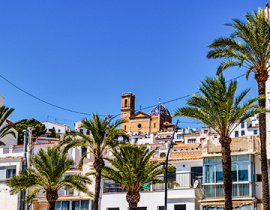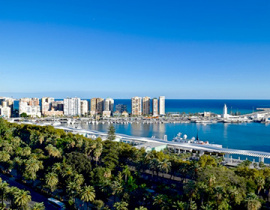Spain: Top Sustainable Destination to Live and Travel
2024 seems to be the year of Spain in terms of major achievements in ecological preservation. The BBC chose the 10 most sustainable countries to travel to in 2024. Spain’s Valencia sits on top of the list. Valencia is 2024’s European Green Capital Award winner. It has won recognition for its adherence to more green living.
In the meantime, Lonely Planet has also published “Best in Travel 2024”. Spain has been ranked the second-best sustainable destination right behind Ecuador in the best places to travel list.
Why is Spain a Sustainable Country?
 Spain is an attractive top travel destination with its commitment to environmental events. Spain is the first country in the EU to take initiatives against climate change. It was stated in the recent report of ECF (European Climate Foundation).
Spain is an attractive top travel destination with its commitment to environmental events. Spain is the first country in the EU to take initiatives against climate change. It was stated in the recent report of ECF (European Climate Foundation).
With that move, it is among the top countries that take the lead in the EU to embrace more eco-friendly living. This gorgeous European country acts with a preservation-oriented approach to all the ecological happenings.
In 2015, a 15-year-long agenda has been approved by the United Nations. The Sustainable Development Goals (SDG) 2030 agenda aims to achieve the utmost sustainability level globally. It consists of 17 main goals. The focus of SDGs varies from population control to environmental preservation. For the latter, the goals of sustainable cities, climate action, clean water, and affordable energy matter the most.
Spain has put remarkable efforts into evolving towards a completely sustainable country. In general, the SDG performance index of Spain has reached 91.4. It paints a highly promising picture, especially when ecology and clean energy-related subjects are on the table.
Among coastal settlements, Spanish cities like Alicante and Marbella have reached the green level in climate action goals. The Málaga city took the lead on clean water and sanitation subjects. The city shows strong efforts to improve the quality of life.
Spain’s Policies on Environmental Development
For the past few years, Spain’s eco-focused attention has been drawn to climate change. Global warming is the biggest issue that the Iberian Peninsula faces. The country has introduced the first law against climate change in 2021.
Law 7/2021 on Climate Change and Energy Transition came into force in 2021. The law foresaw to cut down emissions by 23% by 2030 and to achieve complete renewable energy sources by 2050.
Another legislative regulation on climate change was the Draft National Plan for Adaptation to Climate Change (PNACC) 2021-2030. The PNACC was developed as a fundamental planning tool.
It aimed to put out consistent efforts against the impacts of climate change in Spain. The draft outlines 81 sector-specific strategies for certain thematic domains. These are encompassing human health, bio-diversity conservation, forest preservation, and more.
The goal is to slash gas emissions by 80-90% in the future. Spain’s policy now focuses on more functional and environmentally friendly solutions for day-to-day necessities. These mostly focused on transportation, main energy sources, tourism, and consumer products. The Spanish government took significant steps with the support of UN and EU policies towards more energy-efficient living.
Renewable Energy
 Over the decade Spanish government has established a strict implementation on oil and gas consumption. The government started looking for new energy sources. As a part of a more eco-friendly approach, Spain has been ramping up a renewable energy program. It is focused on providing energy from solar panels, wind turbines, and wave energy.
Over the decade Spanish government has established a strict implementation on oil and gas consumption. The government started looking for new energy sources. As a part of a more eco-friendly approach, Spain has been ramping up a renewable energy program. It is focused on providing energy from solar panels, wind turbines, and wave energy.
Recycling in Spain
During the early 2000s, the Spanish government announced new regulations regarding recycling. All companies are obligated to recycle. The products include plastics, paper materials, construction, and manufacturing waste. This practice also promoted adopting recycling habits nationwide.
Preserving the Natural Habitat
Spain is a major nature-preserving country. It is home to over 140,000 km² of terrestrial protected area. The preserved lands of Spain rank second largest in the EU. Plus, the country holds the highest number of UNESCO-designated sites for sustainable development with over 53 Biosphere Reserves.
Not only that, Spain itself is well aware of the value of its most unique natural heritage, its beaches. Spain’s stunning coasts have been ranked among the best places to live in Europe.
Due to the high demand from tourists, the beaches on the exquisite Spanish coasts are facing a threat of pollution. The Spanish government developed a series of precautions to prevent any permanent damage leading to contamination of its beaches. That is why Spain’s shores are strictly protected with a Law of Coasts.
The statistics show that the policy of safeguarding Spain’s breathtaking beaches works quite well. According to the latest index, Spain took first place with the highest number of blue flag recognition. There are over 600 beaches with blue flag awards. Most of them extend from the beautiful Costa del Sol to Costa Blanca.
Towards Sustainable Tourism and Travel in Spain
Spain stands as a global frontrunner in the tourism industry. Tourism serves as a cornerstone of its economy. As the highest-ranked tourism country, Spain took responsible action to transform tourism activities into more eco-sensitive practices.
The government has organized a specially planned advertisement campaign to promote eco-tourism throughout recent years. Sustainable activities were encouraged with the creation of additional hiking and biking paths.
 Spain puts effort into adding newer Vías Verdes, Green Ways, each year to its list. The project aims to reuse old railway lines that are no longer in use. They are repurposed as non-motorized paths to go hiking and cycling for nature enthusiasts. There are now over 117 routes spanning more than 2,900 kilometers throughout Spain.
Spain puts effort into adding newer Vías Verdes, Green Ways, each year to its list. The project aims to reuse old railway lines that are no longer in use. They are repurposed as non-motorized paths to go hiking and cycling for nature enthusiasts. There are now over 117 routes spanning more than 2,900 kilometers throughout Spain.
The Vías Verdes are particularly appealing to explore natural environments and cultural heritage sites in Spain. The Green Ways of Spain allows tourists to discover the most exquisite flora and fauna of the country. The whole project focuses on raising awareness of preserving nature. It is also encouraging more ecological outdoor activities.
As for traveling in Spain, around ⅕ of global CO2 emissions stem from transportation. The government has been also focusing on creating new eco-friendly solutions to public transportation needs.
It is a well-known fact that airplanes are the biggest contributors to global pollution. On the other hand, around 90% of Spanish trains are powered by renewable sources of electricity. The system will lead to a significant decrease in the carbon footprint.
In a remarkably short period, Spain has tripled its high-speed rail operators. The act’s main goal is to reduce the negative impact of airway travel. Spain has cultivated an effective train network over the decade. Now Spain’s railway is in a position to compete with budget airlines on price, speed, comfort, and reliability.
Railway experts and commuters continue to plan new networks along the popular destinations of Spain. For example, Costa del Sol is among the best places to visit in Spain and attracts millions of tourists each year. The highly awaited railway to connect Málaga City and Marbella is expected to be launched soon.
Moreover, the nation aims to encourage a public railway network instead of traveling with a private car or airplane. To do so, the Spanish government has implemented ticket campaigns. They applied discounts of up to 90% for certain ages. They offered free train tickets on certain lines. Within two months in 2023, passenger numbers on Renfe’s commuter trains surged by nearly 36%.
Spain continues to prioritize sustainability in its tourism sector. The expansion of eco-friendly initiatives and infrastructure developments shows its commitment to a responsible tourism approach. In this way, Spain emerges as a leader in sustainable tourism. The nation aims to pave the way for a greener and more environmentally-friendly future in travel.
Sustainable Property: What Does It Mean?
 The eco-conscious approach in the real estate industry spans two different categories. The first is sustainable construction technology. The second is the green living environment.
The eco-conscious approach in the real estate industry spans two different categories. The first is sustainable construction technology. The second is the green living environment.
The construction industry was responsible for about 42% of annual CO2 emissions globally. There is a well-gained consciousness of preserving the natural habitat of Spain nowadays. And recently construction technology has been focusing on more sustainable building practices.
To reduce carbon emissions, most of the well-established developers in Spain choose to embrace new construction technologies. A big part of their eco-friendly projects has the highest energy rates. Some projects can even earn LEED certificates. These authorized certifications mark the real estate development as eco-friendly according to the eco-consciousness standards.
Sustainable living is also trending on a more small scale. Buyers often prefer more eco-sensitive sustainable properties in Spain. Most of them are adorned with energy-efficient features. In most cases, the eco-friendly properties feature more enhanced infrastructure. For example, smart home systems can easily control energy consumption by power-saving appliances.
In addition, Spain’s wonderful climatic conditions offer more advantages to help energy saving. The country enjoys 300 days of sunshine. The construction industry in Spain is familiar with the impact of the climate on living spaces.
To fully benefit from it, the developers in Spain focus on semi-open spaces in the new housing projects. With the use of large-scale windows, homes can benefit from the sunshine most of the year, instead of artificial lighting.
The country’s climate puts out more advantage when it comes to heating. The solar heating system is empowered by renewable energy in Spain. It can help to reduce energy consumption. A big part of the brand-new eco-friendly real estate projects is supported by the solar panel infrastructure.
With these small steps, the real estate industry in Spain is undergoing a remarkable transformation towards eco-consciousness. The developers embrace a focus on sustainable construction. They create more green living environments. The construction industry in Spain is now leading the charge in adopting renewable energy solutions.
Embrace Sustainable Living in Spain!
From infrastructure to design, Spain’s real estate market offers more sustainable options with state-of-the-art construction technologies. Spanish properties are now offering more sustainable living, nourished by the eco-conscious approach.
Browse the most sustainable real estate projects for an environmentally conscious way of living in Spain. You can also view our guide on buying Spanish property step by step. You are always welcome at our offices to get more information and arrange a viewing tour.










